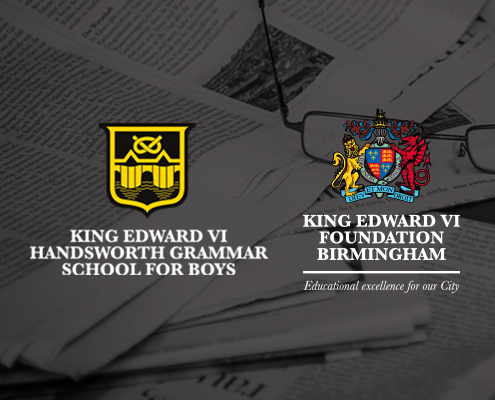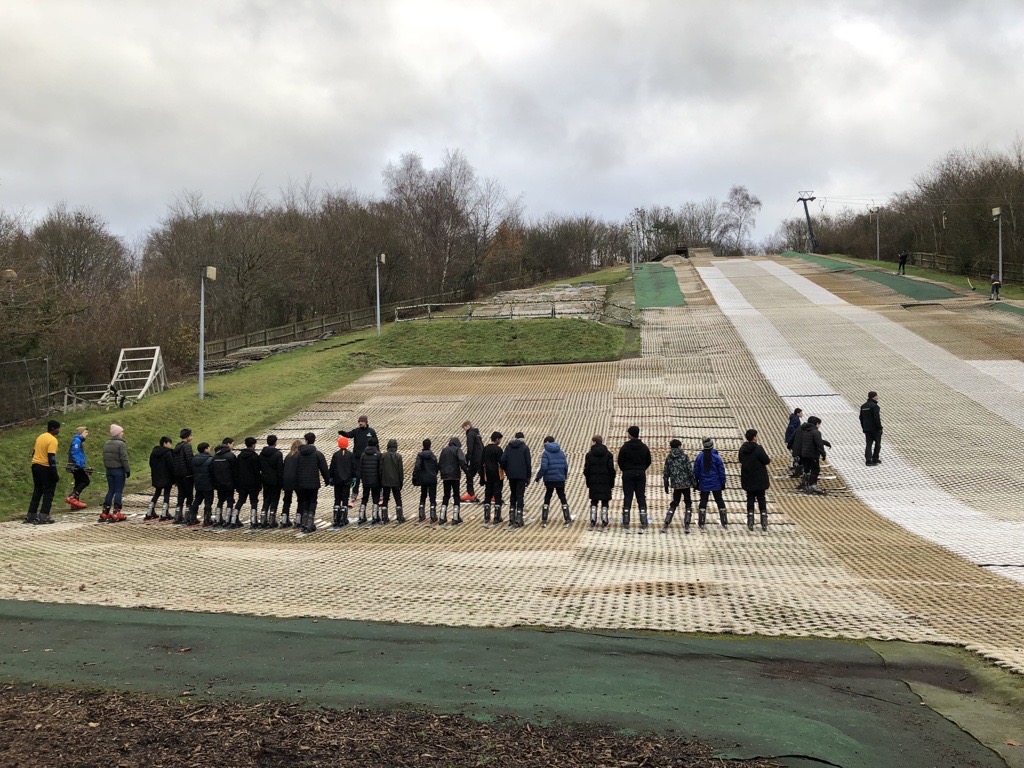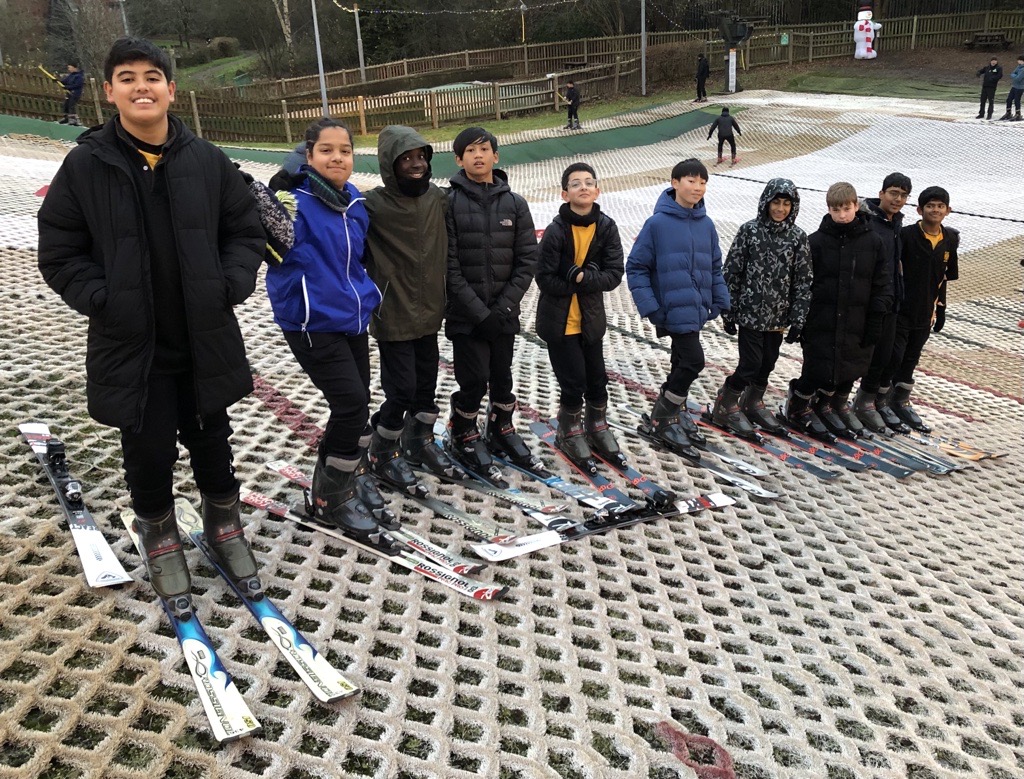Winter Concert 2023
75 of our young musicians took part in the Winter Concert 2023 at St Mary’s Church on November 30, 2023, as part of a traditional programme. The location was ideal for the showcase of musical ability that kept the audience fascinated all the way through.
The school orchestra began the concert, setting the tone for an incredible evening. There was a wide variety of year groups that performed, including the Staff Choir. Mr Conway introduced each of the instrumental solos, duets, quartets, and ensembles that filled the evening before they took the stage. During the interval, a variety of refreshments were available for both the musicians who had already performed and for the eagerly awaiting audience. The audience went back to their seats and awaited the start of the second half with great anticipation.
The school choir sang a Christmas special, Jingle Bells, to bring a festive touch to the concert’s finale, causing a roar of commotion. As the last notes faded away, the audience departed with memories of an amazing musical evening.
Hrithik Bansal 9H
GCSE Geography Trip to Lapworth Museum
We went to the Lapworth Museum, which is a geological museum at the University of Birmingham, where you can learn about rocks, fossils and minerals. They have some amazing exhibits and lots of interactive displays.
To start the day, we learnt about the history of the Earth and the evolution of life. An interesting fact I learnt was that during the Precambrian period, the West Midlands was actually located in the southern hemisphere! We then went through the Active Earth gallery, where there was an interactive globe, displaying anything from the tectonic plate margins to all earthquakes recorded that day. To finish the tour, we went into the Mineral Wealth gallery, where they had a wide range of rocks, gemstones and minerals. We learnt properties to help identify a mineral, including shape, colour, location and size.
Around midday, we moved on to a presentation on tectonic hazards and the types of volcanoes, whether it could be flat or conical in shape so either shield or composite. We were even presented with 6 items associated with a volcanic eruption. Some of the examples were basalt (cooled lava) and obsidian. We got to feel them and study them closely, allowing us to accurately tell the differences, whether it could be rough or smooth, heavy or light. An example of this is pumice, where it is light and filled with holes (from escaped gases).
After getting some lunch, we had a lecture from a professor at the university on the structure of the Earth. We enjoyed learning facts of the Earth such as its magnetic field and providing us with facts we would have never thought of!
Jovan Mann (10W)
Financial Times Student Advocate Programme
Congratulations to two of our year 12 students, Basel Ziyara and Haisem Zeino, that have been successfully selected to participate in the Financial Times Student Advocacy Programme. They represent one of only 250 schools nationally that are fortunate enough to partake in this.
Every academic year, the Financial Times offers up to three sixth formers in each school the opportunity to be a Student Advocate. Student Advocates raise awareness of the benefits of reading the FT in school and develop ideas on how the publication can better engage with young people. They help their friends and teachers engage with the FT, leading to a more aware, worldly sixth form.
Basel and Haisem attend monthly workshops and promote the Financial Times within school and this free resource has proved to be invaluable for many students. As advocates, they develop their ideas with other students from across the world through regular communication and online discussion forums. Both students have significantly developed their time management, leadership, communication, creativity and public speaking skills.
Computing at Cadbury World
On the 8th of December, 46 students in Years 7 and 8 were selected to participate in the Cadbury World educational trip as a reward for their excellent efforts in Computing. This started with a lecture delivered by a representative of Mondelez International about the way that technology is used in marketing Cadbury products, and how social media has been used to promote their snacks and how copyright laws have allowed them to protect the unique purple shade of their packaging. Pupils were asked to suggest marketing ideas that would promote Cadbury chocolate to their age group, with highly creative responses being given in return, from a possible return of “Retro” packaging for the beloved Cadbury treats to promoting special events and items in video games common with the given age group.
After this session, pupils had plenty of fun engaging in a hands-on experience tempering chocolate and writing their own names with it. This followed with an engaging and interactive lecture learning about how chocolate is created and the history of John Cadbury, the man behind the UK’s most beloved sweet.
The Trip concluded with a 4D cinema experience, with students immersed in a rollercoaster-like adventure through chocolate fountains, factories and iconic Cadbury mascots. Finally, the day concluded with a shopping spree at Cadbury’s factory shop, with pupils filling baskets with their favourite chocolate bars and treats, on top of the plentiful free chocolate already granted to everyone throughout the tour.
Overall, this trip offered a valuable insight into how the chocolate we know is manufactured as well as how advancements in technology have helped promote the Cadbury treats to the newer generations.
Miss Zetu
To the slopes
Sixth Form Reward Trip
For the first of our reward trips of this academic year, Years 12 and 13 went to ‘Teamworks Go-karting and Laser Tag’ in Digbeth. After a short 10-minute safety briefing, we immediately started the karting races with tense competition between the competitors! Each group of about 8 had roughly 10 minutes to speed through the curves and turns, attempting to complete as many laps as possible. After the 7 groups raced for the highly contested first places, we had time to cool down and have a lunch break, followed swiftly by another intense session, this time of laser tag.
The laser tag session was as good as – if not better than – the go-karting. Each session of 20 people was a fight for survival, with no-one seeming to want to calm the game down. The solo game saw everyone running, screaming and shooting for their lives, with some even having negative points at the end of it! Some people stayed for an extra session, this time played in teams.
I can guarantee that everyone enjoyed the day and that everyone would love to go again soon!
Haisem, 12PJO
Helsinki Open 2023 Wrestling Competition
Muhammad-Usmaan Ali (8A) has taken part in the Helsinki 2023 Wrestling Competition.
Not only did he have an amazing experience out in Helsinki, he also finished in 3rd place, winning a bronze medal!
Congratulations Muhammad-Usmaan!
During the competition Muhammad-Usmaan had 5 matches with competitors from various countries. Muhammad-Usmaan won 4 of these matches with just one loss.
We wish Muhammad-Usmaan the best of luck with future competitions!


useful links
site info
T: 0121 554 2794
King Edward VI
Handsworth Grammar School for Boys,
Grove Lane, Birmingham,
West Midlands, B21 9ET































